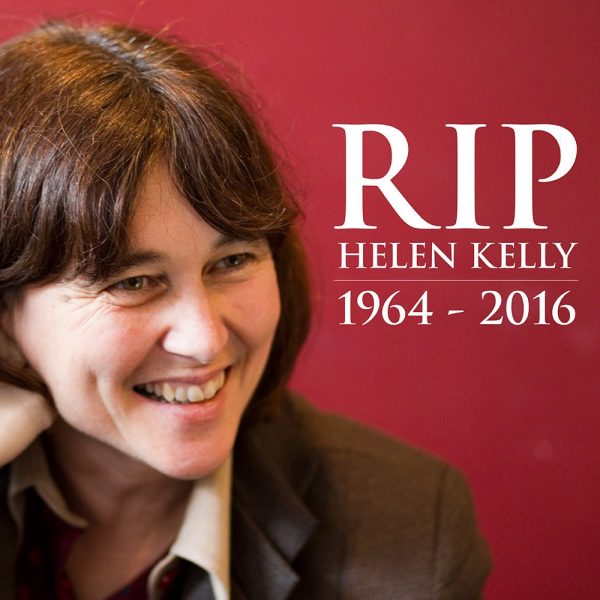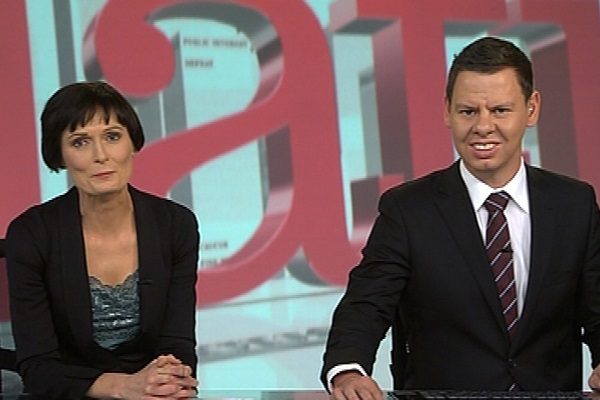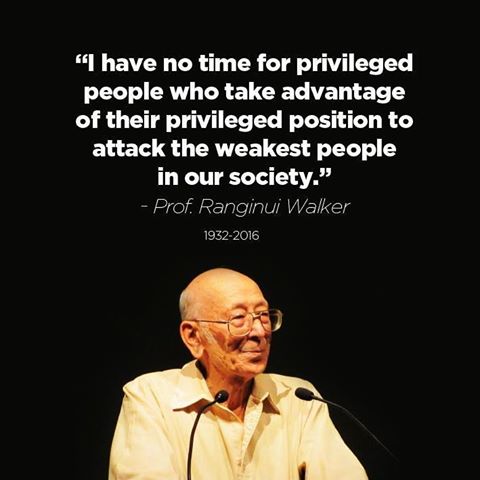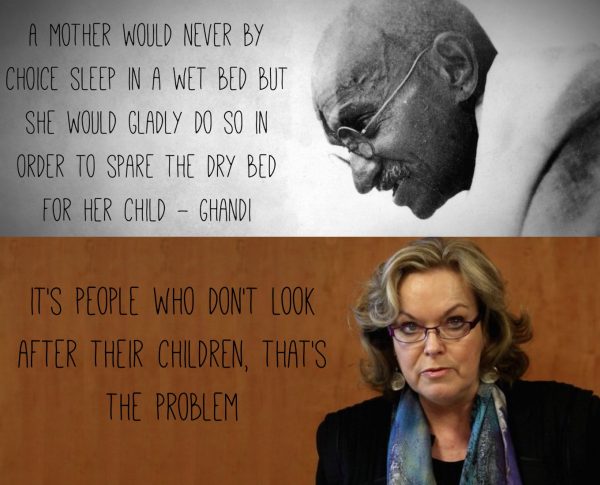Announce protest actions, general chit chat or give your opinion on issues we haven’t covered for the day.
Moderation rules are more lenient for this section, but try and play nicely.

When you consider the position of the Greens on immigration as little as 4 months ago...
Cracks are opening in the Labour-Greens relationship as the Green Party distances itself from calls for a tougher stance on immigration.
Labour leader Andrew Little wants the Government to cut back the number of foreign workers allowed to come here.
But Greens co-leader James Shaw believes that’s scare-mongering.
“I think turning immigration into political football in terms of the effect it’s having on the Auckland housing crisis is damaging, and I think that really tears the fabric of New Zealand society,” says Mr Shaw. “What we want to do here is have a very calm and rational conversation about it.”
…their new announcement today is a u-turn so large it’s almost a full circle…
The Green Party believes shaving 5000 residency approvals off migration numbers doesn’t go far enough.
The Government’s target of between 85,000 and 90,000 a year for the next two years has been criticised as a token gesture.
Green Party co-leader James Shaw told TV3’s The Nation a sustainable policy should be based on about 1 percent of population growth.
“We think that the country needs a more sustainable immigration policy, so what we’d do is set a variable approvals target based on a percentage of the overall population. That would be at about 1 percent of the population, which is historically how fast New Zealand’s population has grown.”
…’sustainable immigration’ has a great ring to it and it shows the Greens have had some soul searching on the issue, the same way Labour have.
For the Greens the issue is sustainability in every sense, for Labour the issue needs to be about exploited migrant work forces.
Here is the grim truth about our current immigration settings. It’s not the 70 000-90 000 who become permanent residents that we need to be concerned about and it’s not their families joining them that we need to be worried with either, the real problem is our scam work/study visa scheme that sees 250 000 desperate students coming to NZ for bullshit ‘education’ programs that end up as bonded servitude with exploitative employers who hold onto their passports.
These 250 000 work hard jobs, many on less than minimum wage and pay tens of thousands for education schemes that are glorified english courses all for the promise of becoming permanent residents.
NZ makes huge money in the education sector and are able to push down labour costs by having a servant class. This huge number of course puts massive pressure on housing, public transport and social infrastructure.
We are exploiting huge number of migrants and then have the audacity to complain about them being here.
We need to stop exploiting these people and stop promising them permanent residence via education. If they wish to come here for education, fine, that’s their decision, but putting in place the pathway from education or employment to residency is exploitative and creating huge pressures on an infrastructure that can’t take anymore.
The only winners here are the greedy exploitative bosses and a Government needing cheap immigration to keep the economy afloat.

When the dearly loved Rod Donald died, there was a service in Wellington and there was one in Auckland. It would be a great shame if we could not do the same for Helen Kelly.
Many Auckland’s and many NZers from around the Auckland region would love to be able to pay their respects.
I think we can all appreciate the terrible loss to Helen’s family and no one would want to put extra stress upon them at this terrible time, but if the powers that be can also look to arrange a service in Auckland, I know many who would love to come.

Good piece this morning on The Nation that focused on NZs ridiculous level of innocent Kiwis being thrown into prison. It was very focused on the joke that is the check and balance that is supposed to be built into our legal process and not the cultural reasons why there is no demand from NZers for a Justice system that only imprisons the guilty.
NZers are more focused on punishing people rather than convicting the guilty. We are a tiny minded and bitter volk who are easily led by a mainstream media who use crime porn to boost ratings and the sleepy hobbits of muddle Nu Zilind worship Police authority like a masochist worships a sadist.
The Kiwi mentality is that if the Police believe someone is guilty, then they are guilty. It annoys Kiwis that they have to think beyond that.
When you have a culture who are so small minded, concepts like guilt and innocence are an annoyance that delays watching Rugby, drinking beer and starting the barbie.
At no point during the show did The Nation reflect on the media’s role in hypoing up crime stories.
No surprises there.

Despite noble principles, the United States’ political system makes a mockery of the promise of democracy. The Presidential contest between Donald Trump and Hillary Clinton brings the limited choice of American voters into focus and highlights just how corrupt things are in the ‘land of the free’. Either of these candidates unleashed on the world are scary prospects, but also humiliating for democracies everywhere because America wields so much weight in the world, exercising political supremacy and military dominance without the moral foundations to justify it.
Trump’s offensive and misogynistic attitudes to women, his tax avoidance, his accumulation of obscene amounts of wealth, are on one side of the ledger. On the other side, Clinton’s association with illegitimate invasions of Middle Eastern states means there’s wet blood on her hands that’s still running in the streets of Iraq, Yemen, Afghanistan, Aleppo and elsewhere in Syria.
Put that against a backdrop of historic electoral horrors that make further mockery of democracy. George W Bush’s usurpation of Al Gore – seems like ancient history- but the discrediting of hundreds of thousands of minorities’ votes in part gave rise to the mess in the Middle East and elsewhere, today; Bill Clinton’s lying about his sordid affairs while in office – and his role in bombing foreign nations in attempted distractions; Richard Nixon’s Watergate; JFK taking the world to the brink of nuclear war. Whatever way Americans vote, there’s a strong insidious and dangerous pattern in American political leadership, and no matter what the outcome of this Presidential election, no doubt we’re all in for more of the same.
And of course, economic and political freedoms in theory don’t always translate into equal outcomes. Domestically, the US has the second highest incarceration rate per capita, in the world. The States have the second highest relative poverty rates in the developed world, and 44% homeless people are workers. The 2014 US Census declared that 14.8% of the general population lived in poverty, disproportionately affecting non-whites. 2013 calculations showed one out of 30, or 2.5 million children to be homeless. There were an estimated 57,849 homeless war veterans in the United States in January 2013, and war vets apparently comprise 12 percent of all homeless adults. Sickeningly, according to Amnesty International USA, vacant houses outnumber homeless people by five times.
Given the economic alienation of many Americans, it’s no wonder political ambivalence also prevails. US voter turnout lags behind most of its peers in the OECD, at 31st among the 35 member states.
But internationally, the world’s ‘largest democracy’ exhibits other contradictory behaviour. It leads the tables in arms exports, accounting for more than 30% of global arms sales to at least 94 recipients, followed by Russia. America is also one of the world’s biggest arms importers. As long ago as 2011 they’d spent $1.3 trillion on wars in Afghanistan and Iraq. Defence spending in the latest year when figures are available, 2013, were $610 billion for that year alone, not counting ‘Homeland Security’, nuclear weapons research and other expenses.
So while actively oppressing Americans at home, abandoning those who have served in its wars overseas, it kills hundreds and thousands elsewhere, often in unarmed drone strikes, destabilising other democracies, spreading fear of destruction around the world, spying on citizens everywhere. But America does so in the name of democracy. All that is scary not just for those in the US ‘land of the free’, it’s scary for you and for me.

The government announced they were reducing the official target number for new permanent residence approvals from 90-100,000 over two years to 85,000 to 95,000. A 5% reduction is of no consequence as far as the problems New Zealand actually faces and how they may be fixed.
For the last few decades, New Zealand has on average lost around 30,000 residents on a permanent or long-term basis every year to overseas destinations – principally Australia.
We suffer this loss because the wealthy capitalists and their political representatives were successful in driving down workers living standards much more in this country than Australia. Combined with the fact we have a right to work there it just made sense for workers to try their hand across the ditch.
The net flows each year fluctuates quite a bit depending on whether there is a recession in Australia or not. If there is the number leaving New Zealand drops significantly and more return home if they lose their jobs. That has been true over the last couple of years which is why there has been a jump in the number of permanent and long-term arrivals over departures recently.
But on average, there has been a net loss of close to one percent of New Zealand’s population each and every year for three decades,
That is why as a country approximately this number has had to be imported if a paralysing crisis was not to emerge.
The end result is that New Zealand has one in four of its population born in another country while one in four people born in New Zealand (who are still alive) live abroad.
That is also why it is simply a lie for New Zealand First to claim that the lack of access to education, housing, transport or other social services is a product of some sort of uncontrolled immigration. We lack these vital social services because the bosses and their governments have taken them from us and we haven’t fought hard enough to stop them.
However, the bosses have used the need for an ongoing recruitment of permanent residents to replace Kiwis heading offshore to create a pool of hundreds of thousands of additional workers living and working in this country on temporary visas with very few rights.
New Zealand is also able to use the fact that it is an English-speaking country to create a whole “Education export” sector earning money off fees from over 100,000 foreign students. This includes the private training establishments but also every tertiary provider including universities and most high schools. They all operate as parasites on the foreign student “market”.
Most people who are finally accepted as permanent residents have started life as students and then gone on the get temporary job search visas tied to particular employers in search of the job with the points they need for residence. Even then there is no guarantee unless they have a very high “score”. For most applicants for residency, they are simply put in a pool and, with luck, invited to apply for residence.
On average one in five of those who start as students or on temporary work visas actually are successful. For many, they have paid hundreds of thousands of dollars in school, legal, and Immigration NZ fees. Many have worked in jobs that they hate but it is difficult to change employer for the sponsorship they need. Some simply buy the job by paying the boss their wage or paying the difference between the minimum wage and the “managers” salary needed by Immigration NZ to qualify.
250,000 people are granted student or temporary work visas each year. Most hope to transition to permanent residency. The government and the bosses know that they are simply creating a pool of labour competing against each other for the right to stay and who are therefore easily exploitable as workers. There are official reports into the issue. That is why there is scandal after scandal being reported in the media and every official MBIE investigation find most emp[loyers are breaking the law one way or another.
The labour movement needs to act to protect these workers. They need the full rights of all other New Zealand workers including the right to change jobs and not be tied to particular employers.
The immigration scam that exists in the country is the one being run by the government and their capitalist mates to use and abuse migrant labour.

Whenever the prime minister or finance minister talk about the prospect of government money being allocated to poverty reduction, they always draw from a medley of three rationalisations to justify dilatoriness: yes there is poverty but who really knows how much; the government won‘t be ‘throwing money’ at it; and they won’t support any policies that can’t justify their existence with measurable results. This last draws attention to the way, for the power elite, measurement and accountability are conceptual tools to use, to reinforce its power. And who is it suggesting that the government throw money at the problem’? Surely the policy suggestion would have been in the form of a provision of funding where it could best help lift more families out of poverty. By definition within the power elite, ‘throwing money at the problem’ is an expression only resorted to if the matter relates to the less well off in society: if it relates to the moneyed parts it is expressed as an investment in the productive sector – an entitlement consistent with their status. And when the power elite refers to real results it is referring to immediately measurable results which, in relation to social issues, is a way of distorting and avoiding the inherent nature of such issues. Such issues are always complex, fundamental, and chronic – therefore not amenable to short-term measures or measurement.
Short-term measurement serves not as a marker for complex social issues but an agent, a device, for making them less likely of solution; an outcome which may not be of particular concern to the power elite because their lack of solution can be used to political advantage: those in the front-line trying to effect a solution can be held accountable, scapegoated for their failures, especially if they have had the temerity to suggest flaws in the proposed policies; and, the idea that the social issues are beyond solution, given time to take hold, can create fear, insecurity, division, a sense of hopelessness, and moral ambiguity. Mixed in with all this is alarm, carefully contrived by the power elite that a political party might come along committed to ‘throwing money at the problem’, their money, as they have been led to believe.
A concomitant of short-term measurement is short term measures, which suits the power elite fine, as short term measures are always cheaper and don’t rely on trust, particularly inter-generational trust, of which it is mightily mistrustful. Contemporary Western society – driven as it is by individualism, managerialism, privatisation, accountability, and deep distaste of the idea of public service – is running perilously short of trust, that vital ingredient to a truly healthy social democracy. All the time, of course, while non-solutions to complex social issues are being showily pursued to political advantage, actual solutions are being ignored, leading to the complex issues becoming more intractable and the ostensible beneficiaries of the non-solutions even more disadvantaged.
The posting’s main argument is that in the current political climate, any changes to education or other social policy, whether intended to help the poor or not, will result in making things worse. The power elite knows this, or goes out of its way not to know it, which is the justification for calling National’s policy on poverty, bitter and cynical.
This cynicism is no more evident than in education. The present government’s education policy is based on a fundamental lie: that the effect of poverty on education achievement is 18 percent. This a figure borrowed from John Hattie, who actually moves the figure around, with 18% being one of them. Hattie, if he relates the figure to research at all, is talking to the kind of research that is limited in depth and reach – not really about achievement but short-term academic rabbit-from-a-hat duplicity. The classic research carried out in New Zealand has the effect of poverty on education achievement as 70 percent. But there is no chance of the government accepting that figure, because government policy is dependent on 18% or thereabouts to gain license to scapegoat schools and blame teachers for stalled or diminishing learning results. The government, in a similar manoeuvre, uses Hattie’s research to poo-poo the learning benefits of smaller classes when the classic research in New Zealand and overseas has smaller classes as an important part of learning improvement. All this is a double-whammy of advantage for the government’s finances not only does the government get-out-from under from pressure to help schools with more funding but also more funding to alleviate the effects of poverty, a role the government cynically exaggerates in its allocation to schools. While severely underfunding public schools the government cries crocodile tears at the failure of schools to deliver children from poverty: when are they going to get their act together? is the pose. Education is the best way, it says, far better than throwing money at the poor, says the government, laughing all the way to the next tax cut for the wealthy and re-election for retention of power.
Also cynical in education is the effect of imposed measurement on children’s learning, such an imposition has the effect of undermining public education, and while not explicitly thought out by the power elite, more demonstrated as a kind of constructed carelessness, the narrowness and emptiness of measurement-laden learning delivers a devastating blow in particular to the prospects of children needing to catch up while middle-class children bolstered as they are with cultural capital, are comfortably placed to take it in their stride and proceed comfortably to university. The children of the poor are dependent for education achievement on a high functioning public education, it is the only option they have, it is where they go. But a public education system of imposed measurement learning; reducing funding; larger classes; multiple deleterious policy changes often introduced as providing choice or increasing efficiency; and of political scapegoating, is not well placed to help such children.
When the needing to catch-up children reach NCEA level 2, but aren’t up to it, then the power elite narrative is: what’s wrong with trades or hospitality, and so on? university isn’t for everyone. But you see, the whole point of education is for children to have a choice. Primary education and the early years at secondary should be organised, and funded accordingly, to ensure children have a choice when course selection becomes especially important to vocational prospects. Think of it like this: many Maori children are in the catch-up category – when they get to NCEA level 2, why shouldn’t they have the choice to go to university, to be the managers, doctors, lawyers, and accountants. It’s not good enough to say: what’s wrong with trades?
In the NZ Herald (Wednesday, 18 January, 2012) was a front page story headed ‘Poverty trap set at birth, study reveals’. This study, based on the long-running Christchurch research into 1265 children born in Christchurch in 1977, is sub-headed ‘Downward Path’ and recounts the already well-known effects of poverty on crime, pregnancy, health, and education. Those from poor families, it was reported, were more likely to leave school without qualifications, have babies before they were 20, commit crimes, go on welfare, and have addiction and other mental health problems in adulthood.

(Please note: There will be regular references in this posting to children from wealthier families and poorer families. To be more accurate the references should be to the degree of cultural capital within these families. As well, referring to children from wealthier and poorer families has a jarringly deterministic flavour. However, I have still persisted in using these labels as a shortcut – a shortcut I request you interpret in the light of the foregoing comments.)
From the school point-of-view the relevant matter in the report is the reference to the effects of cultural capital on education outcomes. The report writers said that ‘it could be that competent, bright families transmit their skills to their children’ and that ‘being bred in a high income family provides children with role models and resources for both educational achievement and career success.’ This is fair enough, the report writers are, of course, on the right lines, but what they say doesn’t really capture the half of it. There is a kind of clinical distancing effect in tone. The conditions in the home of so many poor are chaotic, making somewhat awry, clinical references to such things as the transmission of skills.
It is so easy to sit in an academic office or a political office and see things generally, acknowledging the problems, as this report does but, in my view, failing to grasp anywhere satisfactorily the disorderliness and fantastical limitations, the mind-numbing and overwhelming triviality of many children’s experiences, the violent haphazardness of events. Compare the richness of conversational exchanges between adults and children in some houses and the shouted, impatient, at-wits-end verbal scatterings in others; compare the insubstantial, unhealthy food-preparation-on-the-run in these houses; the never being on your own and the accompanying clamour and disorder; living in cars, garages, tents, and multiple families to a house; the catch-as-can family sleeping arrangements; the transience; the multi, precarious, low paid, all times of a day jobs involving both parents; the broken nights from people returning from pubs, parties, and night shifts; the ugliness of backyards; the grinding effects of poverty; and the hopelessness of ever finding a way out.
And when things go wrong in poor families, they often go calamitously wrong. Martin Thrupp’s excellent book, Schools Making a Difference: Let’s be Realistic, based on close and continuous observation of a student population of a school, details the extreme vulnerability to turns of events of children from poor families. Disruptive events are, of course, more likely to occur in the lives of children from poor families and when they do, the effects are far more devastating.
When the children of poor come to school, however, the mothers have mostly done their best with them, the children scrub up pretty well, keen to learn, and, after all, they are just children, so they are often lifted in the company of other children and their teachers. Indeed, a hopeful perception, might well be that somehow on their delivery to school gates, the children from poorer families, leaving aside genetic inheritance, will perform equally as well as children from wealthier families, and, indeed, so they will as long as they also have had years of intensive adult-child discussions, visits to many places and experiences, people around who read newspapers and books, association with people who have had academic success, a room of one’s own, ready access to computers, a healthy diet, regular health checks, and social stability. But what chance?
The initial approach to the children from poorer families should be that their capacities are the same as other children which, of course, is the initial expectation all teachers should have of all children but, in general, these children are likely to need greater patience; more individual attention; an emphasis on building fundamental concepts and experiences; an avoidance of cramming so that bad, hard to eradicate, learning habits, are not engrained; and a sense of individual success and progress.
The teachers know, of course, what some of these children from poorer families are going through. You see them comforting these children – violence at home, a father in jail, a family separation, all sorts of things that are just a happening too far – yes, I see the teachers comforting the children at crisis moments, hugging them, reassuring them, making sure during the day that a sense of stability is provided. And for these children, in general, I see teachers preparing special programmes, giving special help, allocating teacher aide time to them as available, setting an appropriate pace for their learning. I see them providing sublime patience while they artfully build up children’s confidence, experiences, conceptual understandings, and learning skills.
But look where education is being pushed: a desiccated wasteland of learning. Teaching is becoming formalistic when it needs to be flexible and imaginative; narrow when it needs to be spacious; standardised when it needs to be diverse; a soulless learning cram when it needs to be based on understanding; and leached of real world reality when it needs to be cognitively and affectively rich. Children need the kind of reading and writing programmes developed by our fabled stjcs with their emphasis on the ‘I can read’ ( and ‘I can write’) approach; to experience learning as something they have a say in not something that just happens to them; to be stimulated imaginatively and intellectually challenged – and all this from their first years at school. It is children who experience this kind of learning throughout their primary years who will still be enjoying learning when faced with secondary examinations; and it is this kind of experience that will contribute to whatever schools can contribute to lessening the social reproduction of disadvantage so manifest in our current system.
But the tragedy of what is happening daily in our classrooms. I have been there when a boy has received his reading national standard and at that moment knowing that for him, at six years, reading was over, not only because of that dispiriting information but because I knew he was fated to be subjected to a programme of intensive phonics. Remember how teachers battled against phonics dominating reading, arguing the case for reading for meaning, interest, and in context; remember the Nicholsons and the Tunmers, the conservative politicians, the newspaper editors, the received public wisdom, and Grandma Moses from Kapiti Coast (there’s always a local amateur who has discovered the reading elixir)? For years they held off the damage wrought when the phonics academics overwhelm the classroom developed knowledge of teachers. But now phonics is making a strong comeback as it always does under conservative governments: looking for formalistic education answers to intricate and subtle education questions. This despite recent, compelling New Zealand-Scottish comparative research unequivocally demonstrating that the New Zealand reading tradition was absolutely on the button, that New Zealand children performed well ahead of the phonics-taught Scottish children, and even more significantly, that phonics teaching left a deleterious footprint on the later reading of the Scottish children. Once again, the main victims of the swing to phonics will be children of the poor because they are the ones without the cultural capital to rise above the effects of the misguided teaching that intensive phonics represents.
The alliance of quantitative academics and conservative governments in the matter of phonics is a natural one in the Aotearoa version of class war (as it is in most Western countries): the simplistic nature of phonics, and what appears commonsense, is just what conservative governments are looking for to undermine public education – their thinking is always towards the idea that anybody can do teaching, it is all very straightforward, so why not cut back on teacher training and education, as well, it allows the appointment of bureaucrats with no background in education to feel empowered and righteous about directing and evaluating what teachers do. The conservative governments for confirmation of their view of education then go to a handful of quantitative academics like John Hattie, Tom Nicholson, and Bill Tunmer who because of their obsession with measurement become honorary members of the power elite.
The return of the narrow version of the 3Rs, with the associated reduction in cognitive and affective challenge as the basis for preparing children for life, is an absurdity. It is on children of poorer families that the burden of this absurdity falls most heavily. It is reminiscent of the gardening policies for Maori children at the turn of the century before last. When it is appreciated that such a policy is an illusion disguising a vacuum, the policy goes beyond absurdity to a bitter and cynical strategy. And, beyond the school gate, is the twisting and turning of the power elite to avoid doing something genuine about the growing gap beyond rich and poor. The return to the narrow version of the 3Rs should be seen as a cynical strategy put forward as an all-purpose cover for doing nothing of significance. The idea that the 3Rs is somehow separate from the whole curriculum is a damaging fallacy. The 3Rs, and thinking, exploring, imagining, and expressing are intrinsically interdependent. Children right from year 0, no matter their home circumstances or ability should be cognitively and affectively challenged to enable them to succeed in the 3Rs, in the wider curriculum, at secondary school, and beyond. The idea, openly acknowledged in present policies, and implicit in the idea of league tables, is that first get the 3Rs in place, and then attend to the wider curriculum. If the 3Rs are considered in this way then what happens to children, often those from poorer families, is to experience a repetition of formalistic 3Rs programme to year 8 and even beyond. Such a programme is condescending, limiting, boring, and setting children up, especially children from poorer families, for all most certain failure.
While making political capital about concern for the education of children from poorer families, National (also Labour if you go back to the arguments for the introduction of Tomorrow’s Schools) has used the concept of provider capture to devastating effect. What its use has done is remove teacher knowledge from policy making, leaving the field open to politicians, bureaucrats, quantitative academics, newspaper editors, and that entity known as the public (whose voice is interpreted by these groups). By removing teacher knowledge from policy making, the power elite has been able to get away with the duplicity of bringing in a raft of policies with the ostensible purpose of benefiting children from poorer families, often at little taxpayer cost, that actually disadvantage children from these poorer families while, to some extent, advantaging children from wealthier ones. Children from poorer families, through the obsession with a narrow, standardised, one-pace-for-all education are condemned to a repetition of such a programme through their primary and intermediate schooling years – an education devoid of imaginative, rich, and cognitively challenging contexts. As a basis for learning it is a sure way to limit the development of children from poorer families and a recipe for them to fail at secondary and to rarely be in a position to contemplate tertiary. Meanwhile, children from wealthier families will have the cultural capital to draw on to shrug off a fair bit of exposure to this literacy-numeracy obsession, serving to increase the gap in performance between children from poorer and wealthier families. As well, more children from wealthier families will attend private schools and quasi-private schools to benefit from the freer curriculum and higher funding level.
There are a complex of reasons why teachers are excluded from policy making: the one of provider capture can be revealed as a cynical ploy because all it does is allow the more intensive capture of education by other groups – in particular, of course, the various agencies of government, which are left with near untrammeled power. Why the government has sought such overwhelming power is often rationalised as needing to be in full command to properly represent parents in getting the best possible education for their children. But that argument is a facade, the government’s real reason is not to get the best education for children but the worst for public education. It is not that such a perception has necessarily been consciously thought through, it is more likely derived from an absorption of values from others in the power elite or an attitude of mind derived from the power elite’s neoliberal ideology. This writing argues that children and the curriculum and teachers’ teaching are all contingent on the drive for near untrammeled power, and that the primary reason for that is to divide, destabilise, slur, and disempower teachers, remove their voice, from agitating for increased funding for public education and to obstruct its systematic dismantling.
A great irony of national standards, purportedly intended to keep parents and the government better informed, is that the reverse is occurring. More information will, indeed, be provided but, because of high stakes surrounding the production, it will become highly inaccurate – all the supervision, moderation, and computerisation won’t make a jot of difference. Also, any drop in learning and accomplishment, where and when it occurs, will be managed by the government – is being managed by the government – through its considerably increased command of the education system: the government already has almost complete control of university quantitative research with its contractual agreements; and control of qualitative reporting through it’s highly ideologically charged organisation of the bureaucracies – meaning the education system is already close to being hermetically sealed. When test results become politically sensitive as they increasingly are through the extreme politicisation of education, the government is easily able to change the nature of the tests to its advantage, the test processes, the marking procedures to improve or worsen the results, and the interpretation and reporting of results.
Similarly, any education policy that has choice embedded in the associated rhetoric will end up favouring children from wealthier families. For instance, much is made of parents looking up review office reports and choosing schools on that basis – this is a major distortion; much is made of parents choosing religious schools because of the supposedly more ordered environment – once again, this is a major distortion. Since the year dot of education choice (1989), choice has overwhelmingly been about flight from brown faces. If pakeha and Asian parents could get past this, they would find, as I did in my years of visiting schools, a significant number of schools with a predominance of brown faces where all children received a brilliant education. But over time, the movement away of so many of the most able children has a wearing effect on the functioning of the school and the quality of the education for those left remaining. If choice is available, it is understandable and right that parents should make choices for their children according to their own lights, but it is the responsibility of governments to ensure that the availability of such choice, in its exercise, doesn’t work to advantage one group of children at the expense of another.
Though the attention in this writing has been to education, to make sense of it all, education has been be placed alongside other social policies in the much wider context of attempts by the power elite to maintain the present economic and institutional status quo in the face of axis-shifting political and economic realities. What is happening in education in New Zealand and in other Western countries is unfathomable if not seen in the context of governmental and public responses to significant economic and political change. And, as could have been predicted, the power elite is using the opportunity to place itself to strategic economic advantage and satisfy a deep-seated emotional drive to take it out on the poor and keep them in their place. Using the powerful tools of propaganda and persuasion at their disposal, the power elite, by playing on fear and insecurity, has been able to convince large sections of society to work against their own interests to the particular detriment of the poor.
“Kelvin Smythe was a primary school teacher, teachers college lecturer, and senior inspector of schools. He has been battling the neoliberal agenda in New Zealand education since 1989.”

We have been truly saddened today by the news of Helen Kelly’s passing. Her dedication to good jobs and good lives for working people was total. Her leadership – especially in this last year of her terminal illness – was inspiring. We salute her for the life she gave and the lives she has saved. This Labour Weekend will be hers. Rest in Peace Helen.
…Live Music from 9 pm Friday 21 October
If you’re staying in town for Labour Weekend come and kick up your heels with the Rob Roy Band on Friday 21 October. Local, original and absolutely danceable music, this five-piece ensemble will have you on your feet from 9 pm until late. Book a table for dinner or arrive after 8.30 pm for the bar, tapas and a knees up. There’s no extra charge for the music. RSVP here – for a table and dinner you will need to select a time before 8.30 pm.
Your end-of year lunch, dinner, get-together bookings
Bookings for end-of-the-year get-togethers are starting to roll in. Email Laila or call 021 839661 and book for 6 or 60. We’ll work out a menu to suit budget, tastes and time. Check out the testimonials and view a couple of sample menus when you download a brochure here.

Peter Dunne and this National Government should hang their heads in shame in the wake of Helen Kelly’s death.
That Helen had to become a criminal to gain the cannabis she so desperately needed to ease the pain of the last 20 months of her life is a national disgrace.
Peter Dunne turned down her application using technical jargon to do so and this Government have been spineless in making any real change on cannabis.
We lost a great hero for New Zealand, and yet these smug pricks are the ones that stay alive.
We need real change, not just for cannabis reform, but safety in work places, Union rights, worker rights and the dignity of work.
To not continue those battles she so tirelessly fought would be to dishonour her memory.
Rest in Peace Helen, we will continue to hold the bastards to account.

The right have celebrated the so called $1.8billion surplus announced by Bill English this week.
A surplus you say?
Really?
And how do we have this surplus then?
We have this ‘surplus’ by underfunding Welfare, Education, Housing and Health.
We have this ‘surplus’ because of National’s open door policy from cheap migration and the 220 000 student/work scam visas we allow in each year.
We have this ‘surplus’ from borrowed cash and a national debt now at NZ$ 114,701,442,395
All National have done is carve off and underfund public services so that they have this ‘surplus’ which they will now hand back as tax cuts to the richest NZers in the 2017 election.
Robbing the poor to pay the richest would have outraged egalitarian NZ once upon a time, but now the middle classes are all property investors, this type of sophistry is not only embraced, it is celebrated as amazing economic stewardship.
When does this greed and self inflated sense of importance end? When the market pops and the crash that should have happened in 2007 ruptures through global markets.
When will that happen? Possibly this month…
Market crash warning: Red alert issued
A prominent analyst has issued his second warning over the growing risk of a severe fall in stock markets.
In a new report, HSBC’s head of technical analysis, Murray Gunn, warns that recent selling on Wall Street has been worryingly broad-based.
“With the US stock market selling off aggressively on October 11, we now issue a RED ALERT,” Gunn wrote, according to Bloomberg.
“The possibility of a severe fall in the stock market is now very high.”
…John Key’s vacant aspiration works when you think you have wealth. The illusion of wealth created by Key’s property bubble only works if he can keep expanding the bubble. Once it pops, the middle classes remember they are citizens because they can’t afford to be consumers any longer.

Why are provincial Gangs targeting P Dealers? Because the economics within the drug industry have changed.
When the Police changed laws to lower the evidential threshold from beyond reasonable doubt to balance of probabilities when pursuing assets from the proceeds of crime, they inadvertently changed the odds for criminals.
If you could have your house seized and property taken for making money from cultivating drugs, you may as well make as much as you can and rather than spend it on assets, live on cash. Cannabis cultivation – while extremely profitable – takes at least 3 months to get a payout on.
Meth is a far more lucrative product for cash payouts. Instead of waiting 3 months to make a profit from a cannabis crop, gangs can make the same amount from a cook up of meth in a weekend.
The Headhunters, whose ties with Triads give them access to huge amounts of pseudoephedrine -(the base ingredient for meth), has given them an expansion throughout the regions that is fuelling a meth binge that is devastating the regions and the South Island.
This expansion is creating huge tensions with other gangs who have previously used cannabis as their main source of income. These gangs are now needing to compete with the Headhunters market dominance and cashed up influence….
Gang warfare coming soon to a town near you
Simmering gang tensions will soon erupt into warfare, gang sources say.
It has to do with one gang’s nationwide expansion into the methamphetamine market. And multiple busts and millions of dollars’ worth of property and meth seized have not halted the gang’s trade.
The Head Hunters, the gang the public associate with Sir Paul Holmes’s step-daughter, Millie Elder-Holmes, and her slain boyfriend Connor Morris, are one of the top distributors of methamphetamine in New Zealand.
And it’s not just the police who’ve noticed. Other gangs have, too. And it’s going to come to a head.
“All I’m gonna say,” a Mongrel Mob source said, “is that everyone has their eye on what they’re gonna do now. We see them setting up in the hood – we just gonna let it lie for now. But they gonna push it soon and something will go down and it ain’t gonna be pretty,” he said.
Organised Crime Detective Superintendent Virginia Le Bas said the Head Hunters’ success so far is that unlike other gangs, members operate on a business model.
“Mongrel Mob and Black Power are individual groups,” Le Bas said. “They don’t have an allegiance to a national group, they work individually in their own centres.
“The Head Hunters have one strategy: They all report back to Auckland. They are organised.
“They could have expanded years ago, but they didn’t,” said a Black Power source who preferred to remain anonymous.
“Now they are and they’re going all out. I know they are setting up HQs in towns, heading south [from their Auckland base]. They are going to have a presence across the country soon. They are moving fast.”
The Head Hunters have been known to “patch over” small operators, bringing them into the business model. In November 2015, the Head Hunters patched over the Epitaph Riders in Christchurch. The headquarters there now flies a Head Hunters flag.
The Black Power source said the gang’s reach is strong both inside prisons and out on the streets. The police say the gang’s reach even extends outside New Zealand.
“It is obvious that the Head Hunters have connections with Asians involved in organised crime,” Le Bas said. “We believe this is how the gang is getting the precursors to methamphetamine from Asia.”
The Head Hunters are running a disciplined operation, says the Black Power source, which is backed up by a Head Hunter who wished not to be named.
“We don’t do P, we aren’t allowed to do P and we don’t want to, either. We keep fit and we are like a family,” he said.
“Yeah, we have heaps of whanau all over the country now, because the people want us there.”
The Black Power member said the Head Hunters are not allowed to smoke meth and are encouraged to do physical activity.
“They are not allowed to smoke the stuff. Bad for bizzo if you have crackheads selling crack. I know a few snort it to get around the rule.”
Le Bas said police know about the gang’s methamphetamine plans, which is the reason for the expansion.
“They are disproportionately represented in the manufacturing and distribution of methamphetamine around New Zealand.
“The Head Hunters come up regularly in many of our operations where we are investigating methamphetamine distribution throughout New Zealand.”
On January 12, Suman Eve Kumar was sentenced to three years’ jail in the Nelson District Court on seven drugs charges.
The court heard how she turned to P after the sudden death of a child.
Later, she fell in with the Head Hunters gang, fronting a lucrative commercial drug dealing operation with at least four employees, supplying methamphetamine and LSD in Nelson Bays.
On December 21, a raid on the Head Hunters netted drugs, $20,000 in cash, $6500 worth of melted-down gold jewellery and a five-tonne digger.
Also seized were a stolen motorcycle and 1kg of ephedrine, enough to make 68 grams of methamphetamine.
Police seized the items after searching five properties in Whangarei with 11 people connected to the gang arrested and charged with a range of meth charges.
It’s not just items seized. Police are also investigating the Head Hunters’ property portfolio.
“We know, and most people around the communities [where the gang has recently expanded] will know, the Head Hunters have got properties and their fight clubs. They don’t make any secret of what they’ve got,” Le Bas said.
“That’s something we’re interested in – how they’ve established the funds to purchase the properties. And if it’s related to crime, then there’s work that we can do in recovering those assets,” she said, through the Criminal Proceeds (Recovery) Act (2009).
Many of the crack-contaminated houses people read about are Head Hunter properties, she said.
A Mongrel Mob source said the expansion across the country is because the P trade has become a big money-spinner in rural centres.
And that explains why the Head Hunters are flouting the unwritten rules that New Zealand gangs operated on for so many years – everyone knew whose turf was which and all kept, generally, to their own.
“The Head Hunters have now said, screw the rules. We want it all,” the Mongrel Mob source said.
“It’s pretty massive how fast they are rolling out across the country, but you know something’s gonna give soon. When you start trying to dictate how things should roll in towns you’ve just moved into, the people and gangs can only stand so much, eh?”
But all three gang members agree that when the shooting starts, those not in a gang have nothing to fear.
Indeed, in a minor incident in a Waikato town recently, some Head Hunters new to the town were shot at. Police have refused to comment over the incident.
“If you’re not in it, then you’re all good,” the Mob source said.
Le Bas agrees.
“There’s a lot more maturity around gangs and what their retaliation looks like.”
…we are seeing the unintended blowback of prohibition laws and it’s going to spark a massive amount of violence as provincial gangs fight for power.
P dealers backed by professional Gangs like the Headhunters (whom Greg O’Connor was noting had better recruitment resources than the Police this week) are moving into areas they haven’t previously been part of and that’s what is causing the friction.
We’ve seen over the last couple of months local gang members disappear suddenly after being approached by external gangs wanting to expand meth into their turf, the potential for this to move from targeted assassinations to full scale war is very real.
Ngaruawahia could be the first to descend into that war.

The loss of a compassionate warrior
“Helen Kelly was a compassionate warrior who fought for the rights of ordinary working New Zealanders, and she will be greatly missed,” says Ian Powell, Executive Director of the Association of Salaried Medical Specialists (ASMS).
“Her death is an enormous loss both to the union movement she led so effectively and also to the many people she helped by campaigning to make people’s working lives fairer, safer and better paid. For those who worked with her, and those close to her, she was known as a determined, generous and kind person who remained, until the end, a strong voice for change.”
Mr Powell says ASMS was honoured that Helen Kelly addressed the ASMS Annual Conference late last year on the role of unions as public institutions doing valuable work. She received a standing ovation from senior doctors and dentists present, and made a lasting impression.
“We are so sad to hear of her passing and our thoughts are with her family.”